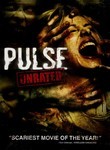 University student Mattie Webber (Kristen Bell) is desperately wanted... by the dead. In fact, thanks to her boyfriend's technological blunder, our dearly departed are viciously sucking the will to live from everyone in the world via their cell phones and wi-fi connections. Yes, you read that last sentence correctly. After co-writer Wes Craven abandoned his directorial post, television commercial director Jim Sonzero (who ridiculously refers to the project as a "cautionary tale" concerning the overuse of technology) assumed the captain's position on this remake of a 2005 Kyroshi Kurosawa film.
University student Mattie Webber (Kristen Bell) is desperately wanted... by the dead. In fact, thanks to her boyfriend's technological blunder, our dearly departed are viciously sucking the will to live from everyone in the world via their cell phones and wi-fi connections. Yes, you read that last sentence correctly. After co-writer Wes Craven abandoned his directorial post, television commercial director Jim Sonzero (who ridiculously refers to the project as a "cautionary tale" concerning the overuse of technology) assumed the captain's position on this remake of a 2005 Kyroshi Kurosawa film.Now, I have not seen the original version of Pulse, but it's fairly safe to assume that this Americanized version conforms to previous Japanese horror remakes in the respect that it trades ingenuity for recycled cheap thrills. Frequent genre producer Joel Soisson (Feast, Dracula 2000) sounded proud when he said they've "expanded" upon the predecessor to make it "bigger and scarier." I saw the trailer in theaters, sandwiched between a Sprite ad and a Fandango ad, and thought that although it was clearly a doomed production with a preposterous premise, the terrifying visuals alone would be worth the price. Said visuals even reminded me of a recent horror remake that I love, William Malone's 1999 House on Haunted Hill, which in my opinion had rare success in expanding upon its roots and in making it uniquely and consistently chilling.
Combining tired cliches with an uninteresting onslaught of slow-moving scenes that fail to progress the storyline, Pulse succeeds in driving the horror genre, which is already on life-support quality-wise, even deeper into obscurity. The only kinship to Malone's work exists in some severely underused quick cuts that display horrific images unrelated to the subject matter (this is my favorite aspect of House on Haunted Hill and even Malone's inferior follow-up, feardotcom - the seemingly reckless carnival of creepy images spicing up the scares). I almost want to give the filmmakers credit for toying with the watch-co-eds-get-killed-in-succession formula, but their adjustments don't amount to much. Our "twist ending" isn't even a twist, really. It is merely an atypical result among Pulse's peers. Possibly the only positive to be found is in the occasionally evocative composition.
The characters, whose minimal development quickly grows tedious, are so boring that I didn't care which of them lived or died. The males in particular were so annoying I wanted them to die simply to get them out of the movie. And to think that these archetypes are conceived to reflect and relate to modern day youth. Maybe a plague of ghosts who download themselves onto these kids' iTunes wouldn't be so bad after all.
Even if you're a horror-buff you should probably skip Pulse. If you've seen the trailer, you've seen everything you need to see and you've probably experienced more terror than the film itself has to offer. It'll take me a while to justify paying full price for it, but at least it helped me prove once again that negative reviews are so much easier to write than positive ones.


